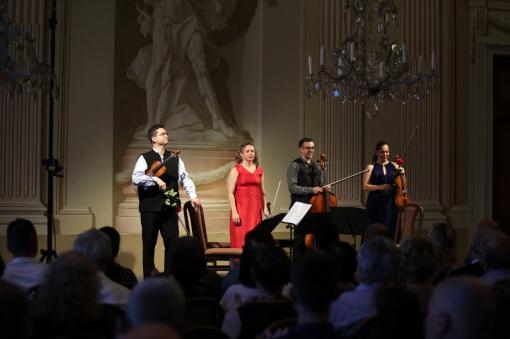Visitors to concerts meet quite often with quartet compositions written by masters of European music. Haydn's string quartets are perennial stars in the repertoire of a number of ensembles and attention is also paid to works of contemporary European composers. Only exceptionally, however, can listeners take a peek into the musical cuisine of Asian or South American nations. Cuarteto Q-Arte decided to fill this blank space and dedicated itself to the works of Latin American authors. The programme, which they presented yesterday at the chateau in Slavkov u Brna (Austerlitz), consisted of works by Silvestre Revueltas, Alberto Ginastera and Astor Piazzolla. All these three composers combine elements of domestic culture with European training and influences or impulses of different genres.
The ensemble started the evening with a ferocious, rhythmically striking String Quartet No. 4 "Música de Feria" by the Mexican composer Silvestre Revueltas. The composition titled Música de Feria (Fair Music) was created in 1932 and it was not until much later that it started to be ranked among string quartets. The work is characterised by a sharp, sometimes even succinct rhythm, which almost called for an uncombed or raw rendering. It should be added that the musicians – in the best sense of the word – were completely unmerciful with Revueltas' composition. Wild cuts of the strings overflowed with energy and underlined the modern musical language of this Mexican composer. Special praise is deserved by the violist Sandra Liliana Arango Calderón, whose pulsating ostinatos emerged to the surface more than is usual with this instrument. That is why the ensemble's sound was so full at all times, even in the most exalted spots of the composition. The String Quartet No. 1, Op. 20 by Alberto Ginastera, which followed the impassioned opening composition, spoke to the listeners in a language a little more comprehensible, yet still expressive and colourfully diversified. The interpretive power of the ensemble manifested itself mainly in passionate imitations among various instruments that accentuated the dialogical principle of Ginastera's music. However, in the more dance-like parts of the piece, the musicians managed to slow down from their predatory approach, and the sharp ostinatos turned into light and clear accompaniments. A great praise is also deserved for the work with the dynamics in the second movement of Ginastera' quartet, where the combination of sharp pizzicatos and fine staccatos formed a charming and balanced sound combination. From the colour combinations point of view, it was probably the richest work of the concert – playing col legno [hitting the string with the stick of the bow], free falls of the bow, playing behind the bridge, artfully used pizzicato and many other violin techniques ensured a constant metamorphosis of the musical message, all in a precise and non-rigid interpretation of the musicians.
The closing "María de Buenos Aires" Suite in instrumentation by José Camacha came from the Argentinian master of tango and virtuoso bandoneon player Astor Piazzolla. After the expressive compositions of the previous authors, the sweet melody of Piazzolla's music was a welcome change and a successful ending in the concert. It was here that the musicians gave way to the legendary warmth of South American music. The lyrical conduct of the main theme in the introductory tango was highlighted by the musicians with sighing dynamics and relaxed rhythm.
The ensemble Cuarteto Q-Arte presented the audience with works that are missing on European stages. Hence, lovers of elemental, but also tender and lyrical South American music did not have to go to the hot landscapes of South America, but could listen to the music by Silvestre Revueltas, Alberto Ginastera and Astor Piazzolla in the cosy historic hall of the Austerlitz Chateau.
Cuarteto Q-Arte
Silvestre Revueltas: String Quartet No. 4 "Música de Feria"
Alberto Ginastera: String Quartet No. 1, Op. 20
Astor Piazzolla: "María de Buenos Aires" Suite
Historical Hall, Chateau, Slavkov u Brna (Austerlitz), 11 June 2019
































No comment added yet..